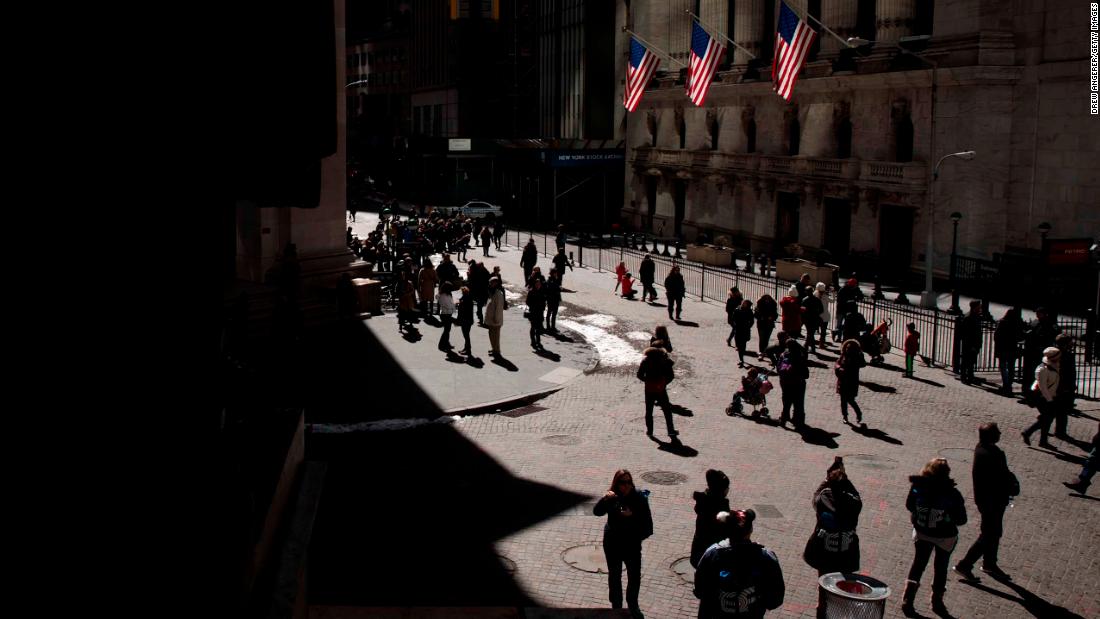
The former real estate mogul-turned-president has repeatedly cited the upward swing in stocks as evidence of his successful economic stewardship -- but now, just as he faces his first reckoning with voters, the market's begun to wobble, erasing a chunk of the gains Trump has bragged about.
In a tweet shortly before markets opened in New York on Tuesday, Trump acknowledged the recent volatility, claiming investors are "taking a little pause" as they await the final outcome of the midterm elections.
"The Stock Market is up massively since the Election, but is now taking a little pause -- people want to see what happens with the Midterms," said Trump in the tweet. "If you want your Stocks to go down, I strongly suggest voting Democrat. They like the Venezuela financial model, High Taxes & Open Borders!"
He later tweeted about new consumer confidence figures released Tuesday, showing optimism at an 18-year high.
Trump's tweets come a day after the Dow swung more than 900 points from its highs of the day to its lows, and ended with a more than 245-point loss. Stocks fell Monday after Bloomberg News reported the administration was weighing deploying a third tranche of additional tariffs on China in early December, if the two countries fail to make headway to break a trade deadlock when Trump and President Xi Jinping meet during the G20 in Buenos Aires later next month.
The Dow recovered Tuesday, soaring 300 points after Trump indicated that he is willing to negotiate with China on a trade pact.
October has traditionally been a volatile month for stocks, but this month's rout is on pace to be the worst in nearly a decade, said James Baird, a partner and chief investment officer for Plante Moran Financial Advisors, in a note to clients. Investors have become increasingly jittery over future rate hikes by the Federal Reserve, a persistent trade rift between the United States and China and uncertainty over the upcoming midterm elections that could cost Republicans control over Congress.
Since October 1, Baird noted, there have been eight trading days with market moves of more than 1%. "Friday's market decline of 1.73% not only added to the list, but it ultimately pushed the S&P 500 close to correction territory (defined as a 10% decline from its peak.)," Baird wrote.
In the run-up to the elections, Trump has also repeatedly blamed his own Federal Reserve chairman, Jerome Powell, for a wobbling stock market.
He's more recently called the Fed "crazy" and "loco" over repeated interest rate increases.
He also told both Fox News earlier this month and the Wall Street Journal last week that Powell is a "threat" to his own economic agenda -- a move some interpreted as a sign of his frustration at not being able to influence Fed moves.
Trump cited a Wells Fargo analyst in a separate tweet on Tuesday nothing that if the Fed showed signs of slowing down on rate hikes it could serve to buoy the market.
"'If the Fed backs off and starts talking a little more Dovish, I think we're going to be right back to our 2,800 to 2,9000 target range that we've had for the S&P 500,' Scott Wren, Wells Fargo," the President tweeted.
Top Fed officials have downplayed the impact of the market rout on the US economy, arguing the recent turbulence would need to be sustained to alter their growth forecasts.
"While a deeper and more persistent drop in equity markets could dash confidence and lead to a significant pullback in risk-taking and spending, we are far from this scenario," said Cleveland Fed President Loretta Mester in a speech late Thursday in New York.
With seven days left before the midterm elections, Trump's dialed up the intensity of his political schedule crisscrossing the country to attend multiple rallies before voters cast their ballots.
But a hate-fueled attack on a Pennsylvania synagogue, a politically motivated attempt to bomb Democratic figures and a seemingly racially motivated double homicide in Kentucky have complicated the president's plans to close out the midterm season.
Trump has repeatedly mischaracterized Democratic policies as "socialist," and in his tweet, referred to the collapse of Venezuela's socialist economy, a call echoed Tuesday by others in the administration.
Marshall Billingslea, the Treasury Department's sanctions deputy, said Tuesday the implosion of the regime is a "direct challenge" for the United States.
"We've never seen a collapse like this in the history of the Western Hemisphere," said Billingslea, who was speaking at an event at the American Enterprise Institute. "We cannot take it as a given. That cannot be allowed to happen."
No comments:
Post a Comment